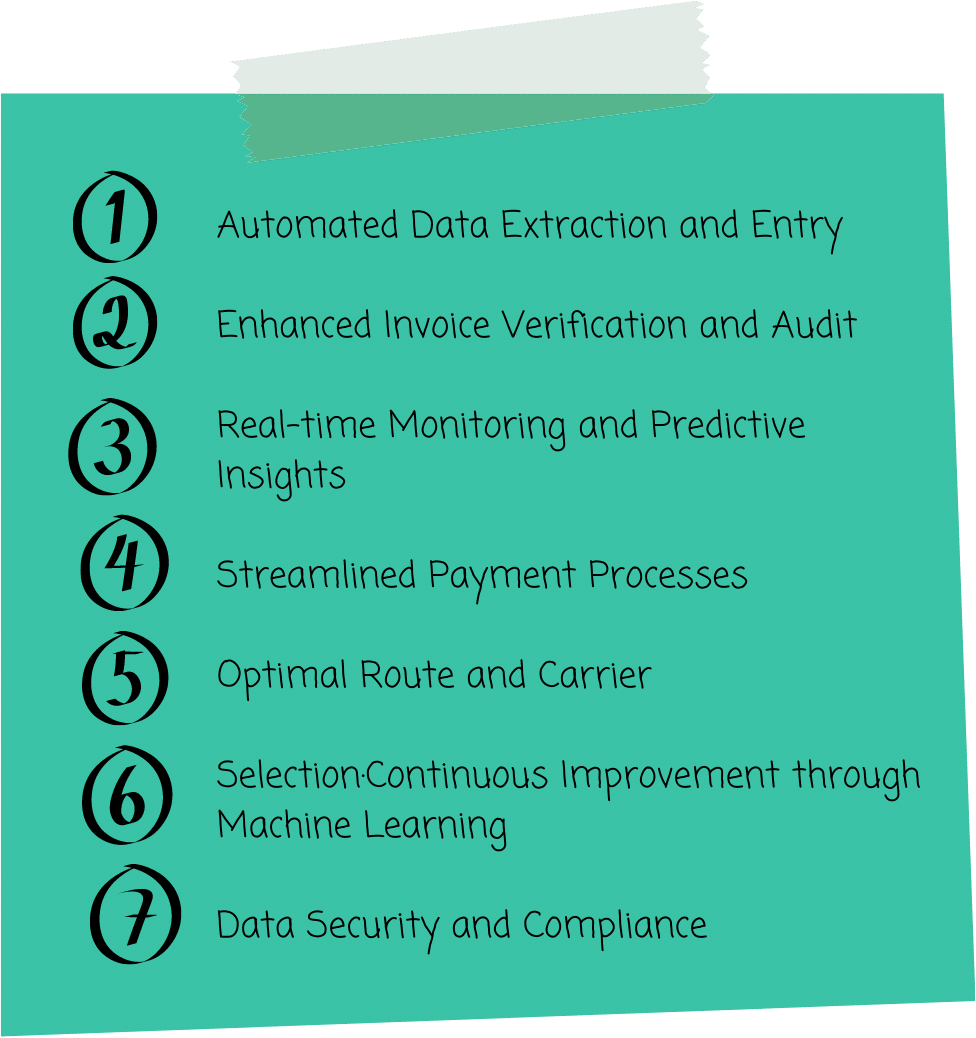Freight invoice processing and audit operations are essential components of the logistics industry, ensuring that businesses efficiently handle their transportation costs and verify the accuracy of invoiced charges. Traditionally, these operations have been manual and time-consuming, leading to delays, errors, and increased costs. However, with the advent of Machine Learning (ML) and Artificial Intelligence (AI), there are tremendous opportunities to streamline and optimize these processes, realizing operational efficiencies like never before.
In this blog, we’ll explore 7 ways ML and AI can improve freight invoice processing and audit operations efficiency, leading to cost savings, improved accuracy, and enhanced decision-making capabilities. These include:

Automated Data Extraction and Entry
Manual data entry is one of the most time-consuming tasks in freight invoice processing. ML-powered Optical Character Recognition (OCR) technology can automatically extract relevant invoice information, such as shipment details, dates, quantities, and costs. By automating this process, companies can drastically reduce human errors and accelerate the invoice processing timeline.

Enhanced Invoice Verification and Audit

AI-powered algorithms can effectively verify and audit freight invoices against pre-established benchmarks and contract terms. These algorithms can detect discrepancies and flag potential billing errors, such as overcharges, duplicate invoices, or incorrect rates. This level of accuracy ensures that companies pay only for the services they receive, leading to cost savings and increased supplier accountability.
Real-time Monitoring and Predictive Insights
AI-powered algorithms can effectively verify and audit freight invoices against pre-established benchmarks and contract terms. These algorithms can detect discrepancies and flag potential billing errors, such as overcharges, duplicate invoices, or incorrect rates. This level of accuracy ensures that companies pay only for the services they receive, leading to cost savings and increased supplier accountability.

Streamlined Payment Processes

ML and AI can streamline the payment processes by automatically matching invoices with the corresponding payments and updating accounting systems. This automation reduces payment delays, late fees, and the need for manual intervention. Additionally, AI can prioritize invoices based on urgency, ensuring that critical payments are processed promptly.
Optimal Route and Carrier Selection
By analyzing historical shipping data and market trends, ML algorithms can recommend the most cost-effective and efficient routes and carriers for specific shipments. This optimization reduces transportation costs and enhances delivery times and customer satisfaction.

Continuous Improvement through Machine Learning

One of the most significant advantages of ML and AI is their ability to learn and improve continuously over time. The accuracy and efficiency increase as the system processes more data and gains more insights. This iterative learning process ensures that the freight invoice processing and audit operations are always up-to-date with industry trends and best practices
Data Security and Compliance
Implementing AI and ML in invoice processing requires handling sensitive financial data. Therefore, robust security measures and compliance protocols must be in place to safeguard against potential data breaches and adhere to privacy regulations.



